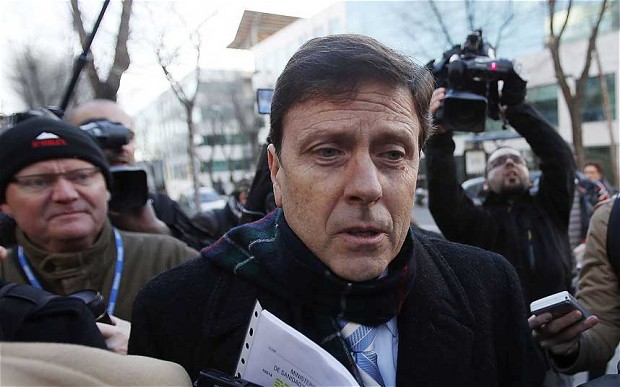Join us on 14 December at 12:00 CET for an online discussion on FIFA and UEFA’s responsibility in responding to the incident that overshadowed Spains’ victory of the Women's World Cup, when Spanish national team player Jennifer Hermoso experienced a violation of her bodily integrity and physical autonomy due to a forced kiss given to her by Luis Rubiales, then the Spanish FA's president.
During the 2023/2024 academic year, the Asser International Sports Law Centre dedicates special attention to the intersection between transnational sports law and governance and gender. This online discussion is the second in a series of (online and offline) events, which explore the way in which international sports governing bodies define the gender divide in international sports, police gender-based abuses, and secure gender-specific rights to athletes. You can watch the recording of our first virtual discussion on the Semenya judgment of the ECtHR on our Youtube Channel.
Just minutes after the Spanish women's national team had won the FIFA Women's World Cup, Rubiales congratulated the players on the podium and grabbed Hermoso's head and kissed her on the lips. This act not only shocked the players and the audience but also caused immediate international uproar and calls for resignation. Rubiales first defended his act, claiming that Hermoso had agreed to it. However, her statements right after it happened, as well as her official statement published just a few days after the event forcefully denied the consensual nature of the kiss. Hermoso felt “vulnerable and a victim of aggression, an impulsive act, sexist, out of place and without any type of consent". Three months later, Rubiales has been suspended by FIFA for three years, resigned as president of the Spanish FA, and is facing criminal prosecution for the crimes of sexual assault and coercion in Spanish national courts.
As extreme as this case sounds, it is not. In fact, it is a reflection of structural issues that exist in the world of women's football and women's sport more generally. Furthermore, this incident raises the question of the rights of the players subjected to such behaviour and the responsibility of sports governing bodies, and FIFA and UEFA in particular, insanctioning those who are engaging in such actions. How should SGBs respond to such incidents? What type of rules and procedures should they have in place? What are the measures that should be introduced to prevent similar actions in the future? What is the role of states (the Spanish state in the present instance) in investigating and prosecuting these cases?
We look forward to discussing these issues (and many others) with our three speakers, who have followed the case closely:
Kat Craig, human rights lawyer, founder and CEO of Athlead, Senior Adviser to the Centre for Sport and Human Rights;
Alexandra Gómez Bruinewoud, is a Senior Legal Counsel at FIFPRO and a judge at the FIFA Dispute Resolution Chamber;
- Borja Garcia is Reader in Sport Policy and Governance at School of Sport, Exercise and Health Sciences in Loughborough University
The online discussion will be introduced and moderated by Dr Antoine Duval and Dr Daniela Heerdt, and will include short presentations by the speakers and a Q&A with the audience.
This is a free event, you can register for it HERE
Forget the European Championship currently held in France or the
upcoming Olympic Games in Rio. Doping scandals are making the headlines more than
ever in 2016. From tennis star Sharapova receiving a two-year ban for her use of
the controversial ‘meldonium’, to the seemingly never-ending doping scandals in
athletics. As if this was not enough, a new chapter
was added on 14 June to one of the most infamous and obscure doping sagas in
history: the Operación Puerto.
The special criminal appeal chamber,
the Audiencia Provincial, has held that the more than 200 blood bags of
professional athletes that have been at the center of the investigations since
2006 can be delivered to the relevant sporting authorities, such as the Spanish
Anti-Doping Agency (AEPSAD), WADA, the UCI and the Italian Olympic Committee
(CONI). In other words, there is now a good chance that the identities of the
involved athletes might eventually be revealed.

Source: http://www.telegraph.co.uk/sport/othersports/cycling/9834122/Operation-Puerto-doctor-Eufemiano-Fuentes-treated-tennis-players-athletes-footballers-and-a-boxer.html
This case note will analyze the court’s ruling and summarize its most
important findings. Given the amount of time passed since the scandal first
came to light (2004), the blog will commence with a short background summary of
the relevant facts. More...
Update: On 14 April footballleaks released a series of documents concerning Sporting de Gijón. Therefore, I have updated this blog on 19 April to take into account the new information provided.
Doyen Sports’ TPO (or TPI) model has been touted as a “viable alternative source of finance much needed by the large majority
of football clubs in Europe". These are the
words of Doyen’s CEO, Nélio Lucas, during a debate on (the prohibition of) TPO
held at the European Parliament in Brussels last January. During that same
debate, La Liga’s president, Javier
Tebas, contended that professional football clubs, as private undertakings,
should have the right to obtain funding by private investors to, among other
reasons, “pay off the club’s debts or to compete better”. Indeed, defendants
of the TPO model continuously argue that third party investors, such as Doyen, only
have the clubs’ best interests in mind, being the only ones capable and willing
to prevent professional football clubs from going bankrupt. This claim constitutes
an important argument for the defendants of the TPO model, such as La Liga and La Liga Portuguesa, who have jointly submitted a complaint in front of the
European Commission against FIFA’s ban of the practice.[1]
The eruption of footballleaks provided the essential material necessary to test this claim. It allows
us to better analyse and understand the functioning of third party investment and
the consequences for clubs who use these services. The leaked contracts between
Doyen and, for example, FC Twente, showed that the club’s short term financial
boost came at the expense of its long-term financial stability. If a club is
incapable of transferring players for at least the minimum price set in Doyen’s
contracts, it will find itself in a financially more precarious situation than
before signing the Economic Rights Participation Agreement (ERPA). TPO might
have made FC Twente more competitive in the short run, in the long run it
pushed the club (very) close to bankruptcy.
More than four months after its launch, footballleaks continues to publish documents from the football
world, most notably Doyen’s ERPAs involving Spanish clubs.More...
On
the first of May 2015, the Spanish Government finally signed the Royal Decree
allowing the joint selling of the media rights of the Spanish top two football
leagues. The Minister for Sport stated that the Decree will allow clubs to “pay
their debts with the social security and the tax authorities and will enable
the Spanish teams to compete with the biggest European Leagues in terms of
revenues from the sale of media rights”.[1]Although
the signing of the Royal Decree was supposed to close a very long debate and
discussion between the relevant stakeholders, its aftermath shows that the Telenovela is not entirely over.
This
blog post will first provide the background story to the selling of media rights
in Spain. It will, thereafter, analyse the main points of the Royal Decree and outline
how the system will work in practice. Finally, the blog will shortly address
the current frictions between the Spanish League (LFP) and the Spanish football
federation (RFEF).More...
The selling of media rights is currently a hot
topic in European football. Last week, the English Premier League cashed in
around 7 billion Euros for the sale of its live domestic media rights (2016 to
2019) – once again a 70 percent increase in comparison to the previous tender. This
means that even the bottom club in the Premier League will receive
approximately €130 million while the champions can expect well over €200
million per season.
The Premier League’s new deal has already led
the President of the Spanish National Professional Football League (LNFP),
Javier Tebas, to express his concerns that this could see La Liga lose its position as one of Europe’s leading leagues. He reiterated
that establishing a centralised sales model in Spain is of utmost importance,
if not long overdue.
Concrete plans to reintroduce a system of joint
selling for the media rights of the Primera
División, Segunda División A, and la
Copa del Rey by means of a Royal Decree were already announced two years
ago. The road has surely been long and bumpy. The draft Decree is finally on
the table, but now it misses political approval. All the parties involved are
blaming each other for the current failure: the LNFP blames the Sport
Governmental Council for Sport (CSD) for not taking the lead; the Spanish Football
Federation (RFEF) is arguing that the Federation and non-professional
football entities should receive more money and that it should have a stronger
say in the matter in accordance with the FIFA Statutes; and there are widespread rumours that the two big earners, Real Madrid and FC Barcelona, are actively
lobbying to prevent the Royal Decree of actually being adopted.
To keep the soap opera drama flowing, on 30 December 2014, FASFE (an
organisation consisting of groups of fans, club members, and minority
shareholders of several Spanish professional football clubs) and the
International Soccer Centre (a movement that aims to obtain more balanced and
transparent football and basketball competitions in Spain) filed an antitrust complaint with the European Commission against the LNFP. They
argue that the current system of individual selling of LNFP media rights, with
unequal shares of revenue widening the gap between clubs, violates EU
competition law.

Source:http://www.gopixpic.com/600/buscar%C3%A1n-el-amor-verdadero-nueva-novela-de-televisa/http:%7C%7Cassets*zocalo*com*mx%7Cuploads%7Carticles%7C5%7C134666912427*jpg/
More...
On the 24th June 2014 the Spanish Audiencia Nacional issued its ruling on a hotly debated sports law topic: The
whereabouts requirements imposed to athletes in the fight against doping. This
blog aims to go beyond the existing commentaries (here and here) of the case, by putting it in the wider
context of a discussion on the legality of the whereabouts requirements. More...
After a decade of financial misery,
it appears that Valencia CF’s problems are finally over. The foreign takeover by
Singaporean billionaire Peter Lim will be concluded in the upcoming weeks, and
the construction on the new stadium will resume after five years on hold due to
a lack of money. On 3 June Bankia, the Spanish bank that “saved” Valencia CF in
2009 by providing a loan of €81 million, gave the green light for the takeover. However, appearances can be
deceiving.More...
Nearly twenty years after the European Court of
Justice declared in the Bosman case that all professional athletes
within the EU were given the right to a free transfer at the end of their contracts,
the Spanish Tribunal Supremo[1]
provided a judgment on 26 March 2014 that will heighten
a new debate on the rights of professional athletes once their contract expires.
More...